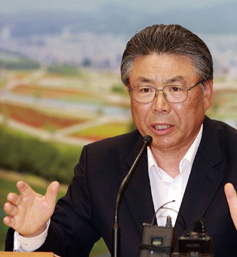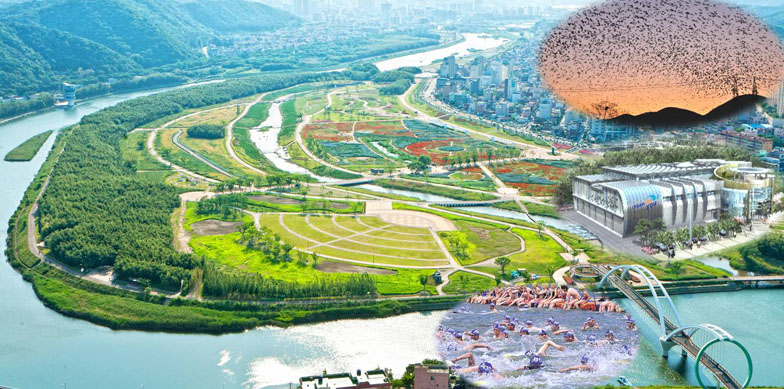Ulsan Metropolitan City Government is the first local government body to win the Presidential Award for sustainable development

Ulsan Mayor Bak Maeng-woo.
The Ulsan Metropolitan City government has been awarded the Presidential Award on Sustainable Development of the 2013 Global Green Management Excellence Award in recognition for its pursuit of sustainable development and lessening the city’s effects from industrialization.
The Ulsan Metropolitan City Government has become the first local government body to win the coveted award.
Ulsan, once a quiet fishing village, has been transformed into Korea’s representative industrialized metropolitan city behind Korea’s economic advances. The downside of industrialization is that the city has been branded a polluted city because of the environmental destruction that followed.
In an effort to improve the city’s environmental conditions, the metropolitan government introduced an eco-city paradigm for ensuring sustainability in 2002. Two years later, the city government announced the Ulsan Eco-Polis Declaration to launch ecological restoration projects in a full-fledged fashion.
Air conditions improved to the levels of major advanced cities. Ulsan Metropolitan City is now shooting for a new leap forward as an eco-city in which industry, environment, and human beings can coexist thanks to its steadfast implementation of green management strategies under the catchphrase “Green City Ulsan with blue skies and clear rivers.”
The city government has come up with extensive steps to improve air conditions to the extent that Ulsan citizens can sense the improvements. National industrial complexes have been designated as special areas requiring countermeasures against air pollution in which stern regulations on emissions are in place. Among the package of steps to cut down on emissions are the installation of tele-metering systems (TMSs), the readjusting upward of the height of chimneys, the strengthening of the allowable emission standards, and the use of such eco-friendly fuels as liquefied natural gas (LNG). Ulsan Metropolitan City has signed an agreement with 295 companies to reduce emissions on a voluntary basis during the period between 2000 and 2016 and encouraged them to invest an aggregated 1.9 trillion won in the field of environmental protection.
In 2009, Ulsan Metropolitan City promulgated a decree on lower automobile gas emissions. The city has implemented countermeasures against automobile gas emissions, including the wider use of natural gas vehicles. These anti air-pollution efforts have paid off: the city has seen sulfur dioxide concentrations plunge from 0.022 ppm in 1996 to the current 0.008 ppm.

The Ulsan Metropolitan City Government announced the Ulsan Eco-Polis
Declaration to launch ecological restoration projects in a full-fledged manner in 2004. (Photo : Ulsan Metropolitan City)
Under the Taehwa River Master Plan, a plan to protect the river that cuts across the city, an aggregated 755.4 billion won has been poured into 43 projects to improve water conditions and build waterfronts. About 1.5 million tons of riverbed sediments that have been piled up for a few decades have been dredged, while wastewater treatment plants have been built to prevent an inflow of wastewater from animal farms upstream. Seven wastewater treatment plants have been built to handle wastewater from houses and industrial sites on top of some 4,000 meters of sewage conduits. As a result, the river, whose water quality was classified as 6th class, has since been upgraded to 1st class in 2007. The river has returned as a habitat for otters, salmon, and daces, as well as a variety of migratory birds.

A view of the Ulsan Metropolitan City Hall.
The city government has been implementing diverse steps to cope with climate change. For instance, thanks to aggressive efforts to buy eco-friendly products, the city topped all other cities and provinces across the nation with a purchase rate of 31.2 percent in 2012. The city has already built a resources circulation system that can not only transform waste into resources but also yield profits. When it comes to resources circulation, Ulsan Metropolitan City is an exemplary city by building an energy/byproduct networking ecological/industrial complex.
Ulsan Vice Mayor Chang Man-suk said, “Ulsan, which ranks 1st in terms of parking area, has turned into a city in which 90 percent of citizens say they want to reside, becoming an example of sustainable development as an eco-friendly industrialized city harmonizing industry and environment.”
Ulsan Mayor Bak Maeng-woo, said “I’m very pleased to become the first local government body to win the Presidential Award along with 1.2 million Ulsan citizens, and our winning of this prestigious 2013 Global Green Management Excellence Award is owed to our citizens who have restored the dying environment with passion and sweat.” He went on to express the hope that the city will rise to a global eco-friendly industrial city harmonizing nature and industry.
